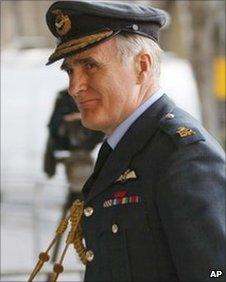Sir Jock Stirrup's exit 'points to defence changes'
- Published

Sir Jock Stirrup has been chief of the defence staff since 2006
Defence Secretary Liam Fox said chief of the defence staff Sir Jock Stirrup and Ministry of Defence permanent under secretary Sir Bill Jeffrey had not been "fired" from their roles, and that it would be very wrong to use language such as "axed".
He insisted there had been amicable discussions and that the decision was about what was best for the department.
Nonetheless, the move offers some clarity after months of speculation over the future of the most senior military officer and civil servant at the Ministry of Defence (MoD), both of whom had been extended in post by the previous government.
It also gives the sense of a new broom at the MoD, determined to try to get a grip on defence, as the new coalition government embarks on one of its toughest tasks; the strategic defence and security review - the first since 1998.
The review is aimed at deciding what role Britain wants to play on the world stage and bringing the UK's defence and security aspirations into line with what the nation can afford in these troubled economic times.
'Vulnerable to cuts'
Liam Fox said that, apart from Britain's nuclear deterrent, nothing would be ruled out from consideration in the review, which could even mean reductions in the number of Armed Forces personnel and an overhaul of procurement and the way the MoD itself functions.
The RAF is seen as the service most vulnerable to cuts.
It has become obvious over the years spent at war in Iraq and Afghanistan that Britain's current procurement strategy is not working.
Massive sums of money have been earmarked for some future projects which the UK no longer needs, while British forces on today's front lines have had to turn to "urgent operational requirements" to buy equipment needed to counter the changing threats in the current war, from armoured vehicles to more teams to counter improvised explosive devices.
The department has long been living beyond its means.
According to the MoD's own internal report, at least ТЃ36bn of equipment has been ordered for which the department has no budget, leading to higher spending as equipment programmes are delayed - adding to the final cost - rather than cancelled.
'Hard truths'
The MoD's annual budget is some ТЃ38 billion.
Sir Jock's appointment had been extended by the last government
There has also been a perception that, under the previous Labour government, senior military officers have not always told politicians blunt, hard truths about the potential costs and consequences of military action.
Since 2001, British forces have been deployed rapidly on campaigns abroad, sometimes with ill-defined aims and not enough troops or the right equipment as well as a lack of the civilian experts needed to work closely with military forces to help stabilise and rebuild conflict zones at an early stage in the mission.
So the changes at the top will be seen by many as an attempt by the new government to draw a line under past failings.
It will also be seen as offering the chance to appoint a new chief of the defence staff - most likely from the British army - and a permanent under secretary able to offer candid advice to the prime minister and the cabinet on the best way to use military power in Britain's national interests.
The candidates to replace Sir Jock, a former jet pilot, include the head of the Army General Sir David Richards, and the vice-chief of the defence staff, General Sir Nicholas Houghton.
- Published13 June 2010
- Published9 June 2010